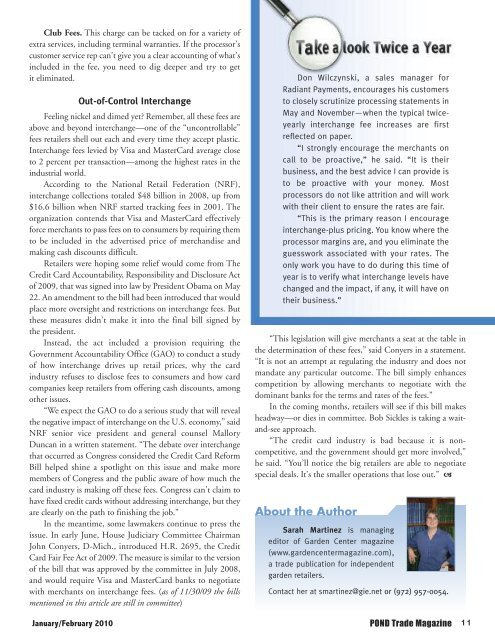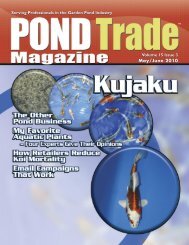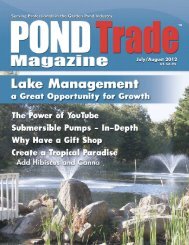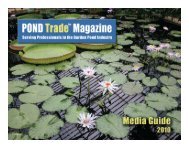Download the January/February 2010 PDF - Pond Trade Magazine
Download the January/February 2010 PDF - Pond Trade Magazine
Download the January/February 2010 PDF - Pond Trade Magazine
Create successful ePaper yourself
Turn your PDF publications into a flip-book with our unique Google optimized e-Paper software.
Club Fees. This charge can be tacked on for a variety of<br />
extra services, including terminal warranties. If <strong>the</strong> processor’s<br />
customer service rep can’t give you a clear accounting of what’s<br />
included in <strong>the</strong> fee, you need to dig deeper and try to get<br />
it eliminated.<br />
Out-of-Control Interchange<br />
Feeling nickel and dimed yet Remember, all <strong>the</strong>se fees are<br />
above and beyond interchange—one of <strong>the</strong> “uncontrollable”<br />
fees retailers shell out each and every time <strong>the</strong>y accept plastic.<br />
Interchange fees levied by Visa and MasterCard average close<br />
to 2 percent per transaction—among <strong>the</strong> highest rates in <strong>the</strong><br />
industrial world.<br />
According to <strong>the</strong> National Retail Federation (NRF),<br />
interchange collections totaled $48 billion in 2008, up from<br />
$16.6 billion when NRF started tracking fees in 2001. The<br />
organization contends that Visa and MasterCard effectively<br />
force merchants to pass fees on to consumers by requiring <strong>the</strong>m<br />
to be included in <strong>the</strong> advertised price of merchandise and<br />
making cash discounts difficult.<br />
Retailers were hoping some relief would come from The<br />
Credit Card Accountability, Responsibility and Disclosure Act<br />
of 2009, that was signed into law by President Obama on May<br />
22. An amendment to <strong>the</strong> bill had been introduced that would<br />
place more oversight and restrictions on interchange fees. But<br />
<strong>the</strong>se measures didn’t make it into <strong>the</strong> final bill signed by<br />
<strong>the</strong> president.<br />
Instead, <strong>the</strong> act included a provision requiring <strong>the</strong><br />
Government Accountability Office (GAO) to conduct a study<br />
of how interchange drives up retail prices, why <strong>the</strong> card<br />
industry refuses to disclose fees to consumers and how card<br />
companies keep retailers from offering cash discounts, among<br />
o<strong>the</strong>r issues.<br />
“We expect <strong>the</strong> GAO to do a serious study that will reveal<br />
<strong>the</strong> negative impact of interchange on <strong>the</strong> U.S. economy,” said<br />
NRF senior vice president and general counsel Mallory<br />
Duncan in a written statement. “The debate over interchange<br />
that occurred as Congress considered <strong>the</strong> Credit Card Reform<br />
Bill helped shine a spotlight on this issue and make more<br />
members of Congress and <strong>the</strong> public aware of how much <strong>the</strong><br />
card industry is making off <strong>the</strong>se fees. Congress can’t claim to<br />
have fixed credit cards without addressing interchange, but <strong>the</strong>y<br />
are clearly on <strong>the</strong> path to finishing <strong>the</strong> job.”<br />
In <strong>the</strong> meantime, some lawmakers continue to press <strong>the</strong><br />
issue. In early June, House Judiciary Committee Chairman<br />
John Conyers, D-Mich., introduced H.R. 2695, <strong>the</strong> Credit<br />
Card Fair Fee Act of 2009. The measure is similar to <strong>the</strong> version<br />
of <strong>the</strong> bill that was approved by <strong>the</strong> committee in July 2008,<br />
and would require Visa and MasterCard banks to negotiate<br />
with merchants on interchange fees. (as of 11/30/09 <strong>the</strong> bills<br />
mentioned in this article are still in committee)<br />
Don Wilczynski, a sales manager for<br />
Radiant Payments, encourages his customers<br />
to closely scrutinize processing statements in<br />
May and November—when <strong>the</strong> typical twiceyearly<br />
interchange fee increases are first<br />
reflected on paper.<br />
“I strongly encourage <strong>the</strong> merchants on<br />
call to be proactive,” he said. “It is <strong>the</strong>ir<br />
business, and <strong>the</strong> best advice I can provide is<br />
to be proactive with your money. Most<br />
processors do not like attrition and will work<br />
with <strong>the</strong>ir client to ensure <strong>the</strong> rates are fair.<br />
“This is <strong>the</strong> primary reason I encourage<br />
interchange-plus pricing. You know where <strong>the</strong><br />
processor margins are, and you eliminate <strong>the</strong><br />
guesswork associated with your rates. The<br />
only work you have to do during this time of<br />
year is to verify what interchange levels have<br />
changed and <strong>the</strong> impact, if any, it will have on<br />
<strong>the</strong>ir business.”<br />
“This legislation will give merchants a seat at <strong>the</strong> table in<br />
<strong>the</strong> determination of <strong>the</strong>se fees,” said Conyers in a statement.<br />
“It is not an attempt at regulating <strong>the</strong> industry and does not<br />
mandate any particular outcome. The bill simply enhances<br />
competition by allowing merchants to negotiate with <strong>the</strong><br />
dominant banks for <strong>the</strong> terms and rates of <strong>the</strong> fees.”<br />
In <strong>the</strong> coming months, retailers will see if this bill makes<br />
headway—or dies in committee. Bob Sickles is taking a waitand-see<br />
approach.<br />
“The credit card industry is bad because it is noncompetitive,<br />
and <strong>the</strong> government should get more involved,”<br />
he said. “You’ll notice <strong>the</strong> big retailers are able to negotiate<br />
special deals. It’s <strong>the</strong> smaller operations that lose out.” a<br />
About <strong>the</strong> Author<br />
Sarah Martinez is managing<br />
editor of Garden Center magazine<br />
(www.gardencentermagazine.com),<br />
a trade publication for independent<br />
garden retailers.<br />
Contact her at smartinez@gie.net or (972) 957-0054.<br />
<strong>January</strong>/<strong>February</strong> <strong>2010</strong><br />
POND <strong>Trade</strong> <strong>Magazine</strong><br />
11









